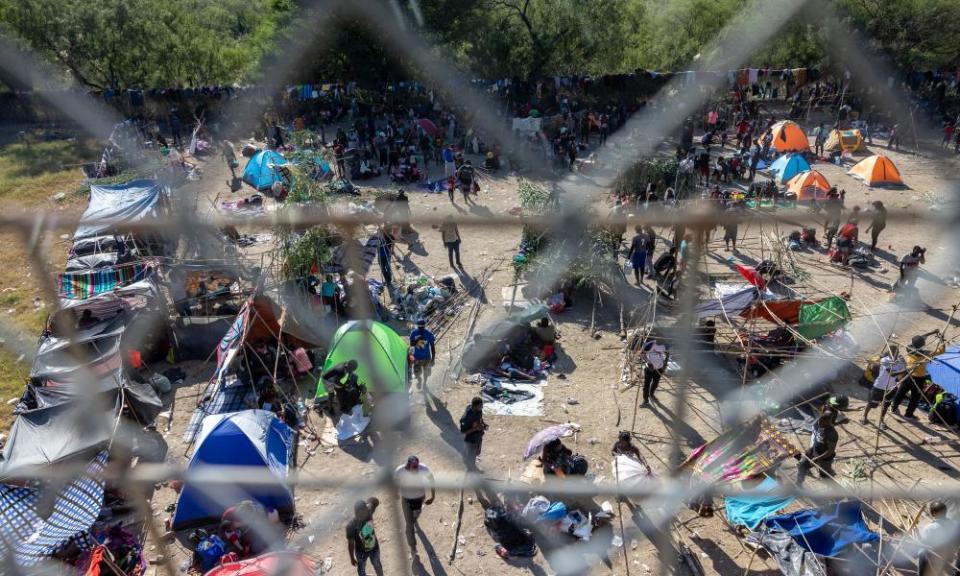How thousands of Haitian migrants ended up at the Texas border

Every night Guy would fall asleep to the sound of gunfire: warring gangs in the Haitian capital, Port-au-Prince, were fighting pitched battles in the city centre.
By day, the country was roiled by bloody protests against food and fuel shortages. Roadblocks with burning tyres were commonplace, and the police responded with tear gas and billy clubs.
“Going outside was scary,” said Guy. “There was no choice but to get out of Haiti.” He started making plans to reach the US – and he was far from alone.
Related: Guns, gangs and foreign meddling: how life in Haiti went from bad to worse
Authorities in the Texas town of Del Rio, Texas, declared a local state of emergency on Friday after some 12,000 migrants – most from Haiti – gathered under and around a bridge on the border with Mexico.
The influx has overwhelmed local officials, presented Joe Biden with a new challenge – and cast a spotlight on the growing migration crisis triggered by the multiple and overlapping calamities which have beset Haiti.
For many migrants, crossing the Rio Grande is just the last small step in a circuitous odyssey that stretches across the Caribbean and deep into South America.
Most fly from Haiti to Ecuador, which does not require a visa for Haitian visitors, before either trying to find work in Brazil or Chile, or heading north, crossing the perilous jungles of the Darién Gap and onwards to Central America and Mexico.
At every stage, they are at the mercy of a security forces and organized crime groups which target travelers, and the rickety infrastructure of the people-smuggling business.
Guy was one of thousands of migrants, again mostly Haitians, who recently became stranded in Necoclí, a Colombian beach town where local ferries to Panama are unable to meet demand.
Like many others, he had been living in Brazil, where he worked at informal construction jobs. But, with jobs drying up and a perceived welcoming attitude from the Biden administration, he set out northwards.
“We follow those that went before us,” Guy said, on a recent afternoon. “It doesn’t matter if it’s dangerous.”

Others chose a more direct, but equally treacherous, journey to the US, chancing their life on the high seas. On Monday, the coast guard intercepted a 35-foot boat carrying 103 people, 18 miles off the coast of Florida. They had been at sea for six days.
There are abundant reasons to flee Haiti. The western hemisphere’s poorest nation – long been dogged by violence, corruption, and poverty – was thrown into further instability in July when president Jovenel Moïse was assassinated in circumstances that remain mysterious.
Related: ‘A forgotten disaster’: earthquake-hit Haitians left to fend for themselves
Natural disasters, exacerbated by climate change and poor planning, also regularly batter the country. A catastrophic earthquake struck southern Haiti on 7 August, killing at least 2,200 people and leaving more than 30,000 homeless.
In Port-au-Prince, insecurity reins. Gangs, often with political backing, have launched a campaign of violence, which has been compared to a civil war. Civilians can be caught in the crossfire, robbed in an instant, or kidnapped for ransom. Meanwhile, public services are all but absent. Rubbish is not collected, and thousands of homes have no running water or a latrine.
“There is no normal life anymore in Port-au-Prince,” said Louis Henry Mars, who runs peacemaking initiatives in the capital’s gang-controlled slums. “There are 165 gangs in Port-au-Prince and they are better armed than the police, so you can’t get rid of them without collateral damage.”
Michelle Mittelstadt from the Migration Policy Institute said she thought the impression – however mistaken – that Joe Biden’s administration would treat migrants more kindly than Donald Trump had also played into the surge in arrivals.
“You went from a Trump administration that essentially did everything it could across the border to restrict migration, legal or illegal, to an administration that views immigration overall as a net asset, and doesn’t view immigrants as a security or economic threat,” said Mittelstadt. “People are understanding that there may be a window to act here.”
But Haitian arrivals hoping for a welcome mat when processed may be in for a rude awakening. The Biden administration has reversed a hold on deportations to Haiti that it put in place following the earthquake. Flights full of migrants began leaving for Port-au-Prince this week, and eight more will reportedly go next week.

 Yahoo News
Yahoo News 